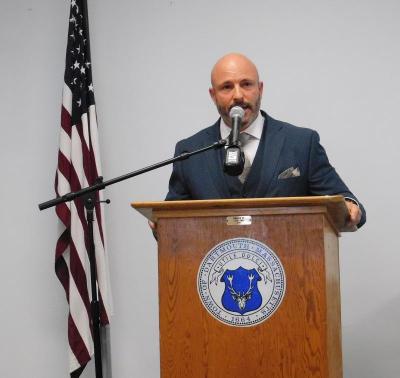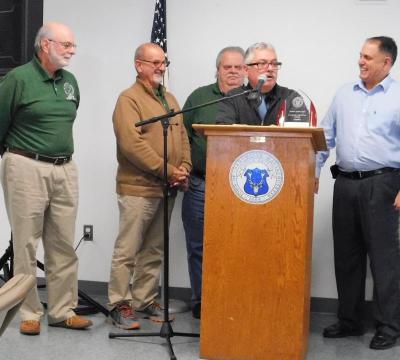Veterans honored at annual breakfast
Opioid addiction. The lifesaving value of being No. 2. The president as a draft dodger.
When veterans shared their stories and thoughts at the annual Council of Aging veterans breakfast on Friday, the content was well beyond the traditional tribute to the men and women who have served our country.
About 150 veterans and their spouses packed the Senior Center’s events hall for the food, the company, and to hear from a variety of speakers at the breakfast, sponsored by the Dartmouth Council on Aging and State Representative Chris Markey.
“As I look around, there are many familiar faces year in and year out,” said Maria Connor of the Friends of the Elderly, who helped organize the event. “It’s something they look forward to.”
Robert Cingolani, a World War II veteran, reflected on his service during breakfast. Raised in Plymouth, MA, he decided to join the Navy because he enjoyed boating. He deployed on a ship that sailed the Cape Cod Canal, where he had fished with his father, and landed in Plymouth, England.
He was a medic and spent much of his deployment on ships bringing soldiers to Normandy on and after D-Day, and picking up and treating wounded soldiers. At some point, they began picking up wounded German soldiers as well.
“We treated them just as well as we treated our own soldiers,” Cingolani said. Most of the German soldiers were about the same age as the Americans, and weren’t hostile to them. Cingolani said many of them had photos of their families. Several, however, he described as “hard nosed Nazis.”
Cingolani recalled one night when his captain was arguing with another about which boat would go first. Eventually, Cingolani’s captain conceded. The other ship went ahead, and hit a mine. Cingolani described how the boat split in half and began sinking — many of the soldiers so shell-shocked they stayed seated as the ship sank into the water.
“It looked like a fire on the water,” Cingolani said.
All of the men on that ship drowned.
“I never heard one soldier say, ‘Why me?’” Cingolani said. “I never heard them complain.”
Cingolani connected his wartime experiences to the present political situation.
“The President was a draft dodger,” he said. “He had a foot condition that was treatable. That’s what bothers me. That was wrong.”
Cingolani, a podiatrist, would know.
“All in all, it was a good experience,” he said. “The war was bad, but being on a ship and traveling across the Atlantic was an experience.”
Cingolani’s experience was echoed by that of another former service member who spoke at the event.
Christopher E. Azevedo, a veteran of Operation Iraqi Freedom, was recently named the Veterans Transition House Veteran of the Year. He works as a peer counselor for other veterans, and suffered from what he called the signature injuries of the conflict in the Middle East: spinal and brain injuries from a roadside bomb.
When he returned home, the Veteran’s Administration treated his injuries with increasingly potent pain medications until he was a “full blown addict” — all while working as a firefighter for the city of New Bedford. He lost his wife and children.
Azevedo said war was an experience of constant trauma which left him with Post-Traumatic Stress Disorder and ill-suited for civilian life. He remarried, but his PTSD began to kick in and he started mixing his pain medication with amphetamines and steroids.
“I was able to get my body to hyper secrete adrenaline, and to be honest with you, I loved it,” Azevedo recalled. “I was able to replicate the high of war, and I never felt more alive at that time.”
He lost his second wife, and begin to feel like a failure. He even contemplated suicide.
“The family members, I know for a fact, oftentimes suffer secondarily to the primary sufferer,” Azevedo said. “Many times they don’t understand why Dad is distant, quiet, why he’s shock sensitive, why he has outrage bursts, different types of emotions.”
Azevedo said the trauma of conflict “breaks” one’s brain and makes it very difficult to return to everyday life. Azevedo is currently working on a book called “The Long Road Home: A Soldier’s Journey from One War to the Next.”
He asked family members and others to be sensitive to veterans’ needs and traumas. He also brought the crowd’s attention to the fact that the United States has been at war for 16 years with no end in sight.
Roy Oliveira, the town’s Veterans Services Officer, was honored for his 8 and a half years of service. He will be retiring at the end of the year.
"I hope I have served you well," Oliveira said.
The VFW presented a donation to the Friends of the Elderly.














